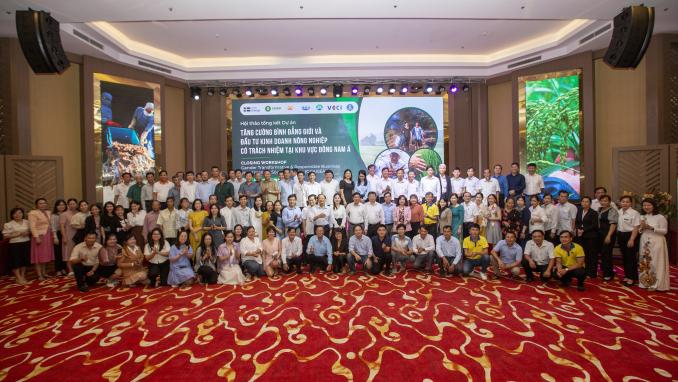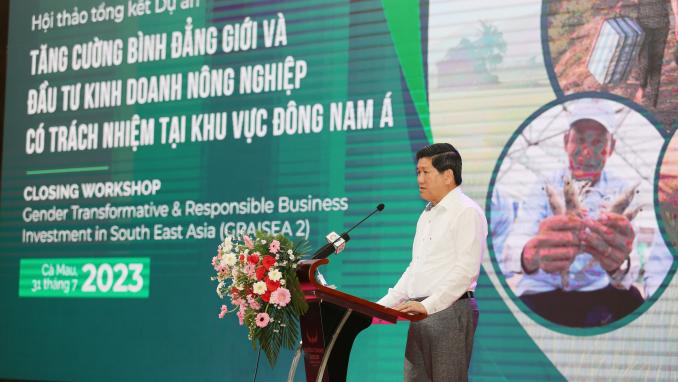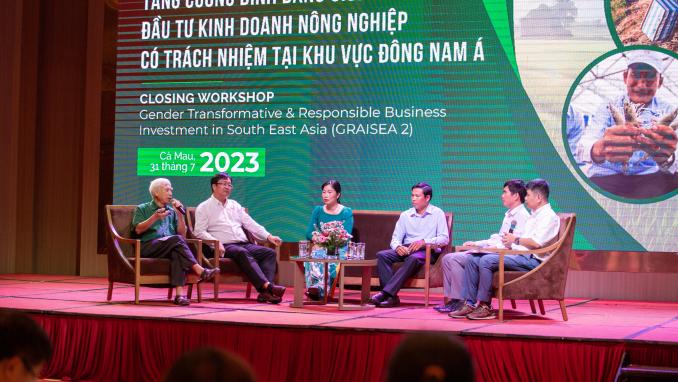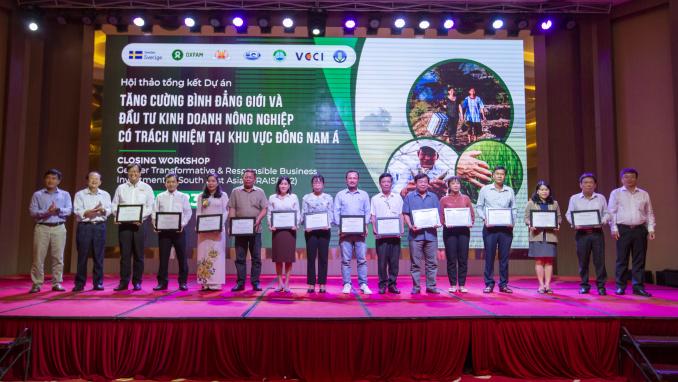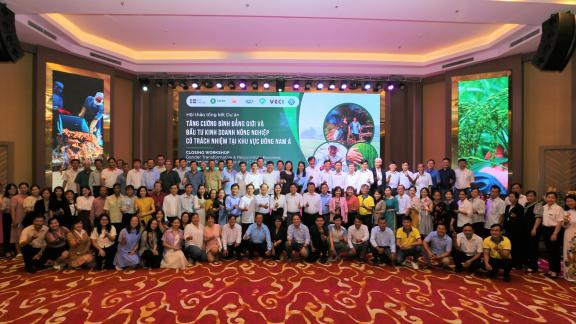
In Ca Mau City on July 31, 2023, the "Gender Transformative & Responsible Business Investment in South East Asia" (GRAISEA 2) project's Final Workshop took place, co-organized by Oxfam, the Centre for Marinelife Conservation and Community Development (MCD), and the Department of Agriculture and Rural Development of Ca Mau province. This workshop aimed to recap and emphasize the accomplishments and progress made in the agribusiness sector over the past five years.
Insights from the Workshop
During the workshop, a comprehensive overview emerged, summarizing the significant progress made in the lives of small-scale producers and workers within the agricultural value chain. These accomplishments have been the result of combined efforts, paving the way for a more promising and sustainable future.
Sustainable Practices in Response to Climate Challenges: A central element of this progress is the widespread adoption of sustainable standards by farmers. These practices serve a dual purpose, securing livelihoods while also contributing to a more resilient agricultural sector in the face of climate change.
Inclusive Business Models and Responsible Investments: Within the agricultural value chain, enterprises have embraced inclusive business models and responsible investment approaches. This fosters balanced growth and a more equitable distribution of benefits for both farmers and workers.
Empowering Roles and Improving Worker Well-being: Noteworthy progress has been made in recognizing and enhancing women's roles within production and agribusiness. This effort ensures the equitable distribution of opportunities and resources. Additionally, a focused approach to worker well-being, particularly for female workers, has played a significant role, resulting in improved quality of life and working conditions.
The workshop's panel session featured insights from various speakers, all sharing their perspectives on the shift towards production aligned with sustainable standards. Despite existing challenges, it was collectively agreed that this shift is a long-term and prudent direction, poised to propel Vietnamese agricultural products towards high-value export markets.
In addition to technical enhancements, the consensus emerged that agricultural production in cooperatives is imperative. It was underscored that both businesses and cooperatives must cultivate and uphold responsible business policies that ensure the well-being of small producers and workers engaged in the value chain.
GRAISEA 2's highlights
The "Gender Transformative & Responsible Business Investment in South East Asia" (GRAISEA) project was funded by the Swedish International Development Cooperation Agency (SIDA) / Embassy of Sweden in Bangkok, Thailand. This project unfolded over a period of five years (2018 to 2023). Its reach encompassed five provinces in the Mekong Delta region, including An Giang, Soc Trang, Bac Lieu, Kien Giang, and Ca Mau.
The GRAISEA project stands as a testament to collaborative efforts, involving participation from entities such as Oxfam in Vietnam, the Center for Research on Resources and Rural Development (RECERD), the Center for Marine Conservation and Community Development (MCD), the Center for International Centre for Aquaculture & Fisheries Sustainability (ICAFIS), and the Vietnam Chamber of Commerce and Industry (VCCI). This joint endeavor underscores the potential for collective action to bring about positive change within the agricultural sector.
During the past five years, the project's results have taken shape in ways that underscore its significance. At the forefront, 4,468 smallholder farmers, among them more than 55% women, have experienced a marked improvement in their income and standing within the agribusiness and production sectors. Simultaneously, 58 cooperatives have made the transition to producing in alignment with sustainable standards. This shift has led to noticeable gains in production efficiency, business growth, and the implementation of improved governance practices.
The impact ripples further as 15 industry leaders embrace enhanced policies and practices related to inclusive business models. 112 small and medium-sized enterprises (SMEs) have actively participated in the project, reaping the benefits of its initiatives. 30 investment cooperation agreements have been forged, fostering a harmonious alignment of business goals with the well-being of all stakeholders. The direct beneficiaries of this collaboration are the workers, with 10,000 individuals now enjoying improved working conditions, fair salary policies, and access to enhanced social welfare benefits offered by participating enterprises.
Acknowledging Progress and Moving Forward
The GRAISEA 2 Project shed light on sustainable practices, gender equality, and worker well-being that reverberate throughout the agricultural value chain. This event highlighted the potential for collaboration to shape a brighter future for farmers and workers alike. By remaining committed to these principles, the industry charts a course toward sustained progress, inclusivity, and shared prosperity.
To quote Mr. Pham Quang Tu, Deputy National Director of Oxfam in Vietnam: "The key to improving livelihoods and enhancing the quality of life of small-scale producers in the agricultural value chain is to strengthen comprehensive linkages among stakeholders, ensuring that benefits, costs, and risks are shared harmoniously and equitably. To achieve this, it's imperative to grasp the motivations, benefits, and challenges faced by producers, businesses, and other stakeholders. From this understanding, we can construct an effective approach."
